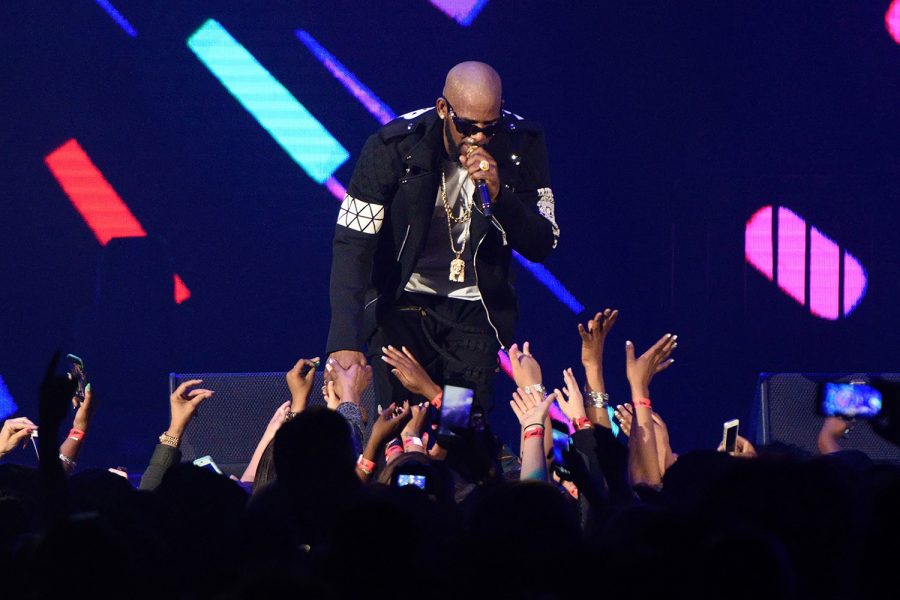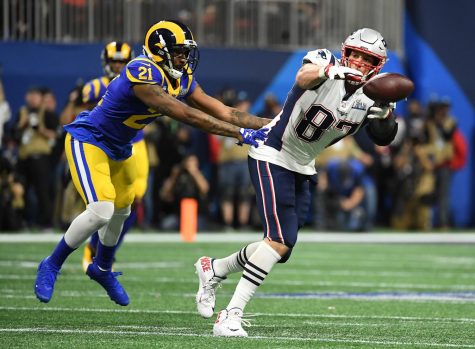Hegde: Music and its controversial creators
Is it necessary to look at a singer’s actions before listening to their music? The question comes with plenty to consider.
R. Kelly performs during The Buffet Tour on May 7, 2016 at Allstate Arena in Chicago, Illinois. (Daniel Boczarski/Getty Images/TNS)
February 4, 2019
According to Spotify’s mission statement, the music app promises to remove music that goes against its inclusive mission, which accepts “race, religion, gender” and so on. While the company removed such controversial artists as R. Kelly — under fire for numerous sexual-misconduct allegations — from their top playlists and recommendations, his music is still available on the application. The same goes for artists such as Chris Brown, who is well-known for numerous criminal offenses, the best known being the abuse of former girlfriend Rihanna.
Many times, because the content of the music does not hint toward anything that breaks policy, nothing stops artists with contentious backgrounds from streaming their music. Similar systems exist on other popular streaming services such as Pandora and Apple Music. While these companies do not condone the behavior of these controversial artists, actions of these companies regarding policy demonstrate that it comes down to the listener to decide whether to listen to artists with disputed backgrounds.
RELATED: Banerjee: The Ariana Grande phenomenon
In this digitized day, overflowing with social-media influencers and the power anyone has to spread information worldwide within seconds, it makes sense that “call-out culture” would thrive. It is a time when anyone can be held accountable by everyone, a truly technological feat. However, what happens when “call-out culture” reaches a singer with music you adore? Are the musician’s reported crimes ignored because the music is amazing? Do you stop listening to some of your favorite songs?
Brown’s “Undecided” has been on Spotify’s Top 50 list for two days. Despite his numerous charges, he is able to not only release music but is still a popular artist. In the case of another occupation, a person’s career would be virtually finished after similar allegations to the ones that many famous artists have received in the last few years. However, in the case of artists, their livelihood remains intact through their products.
Are singers and their songs two sides of the same coin, or should artists and their creations be considered separately?
Scrolling through the numerous threads on social media on this topic, a common phrase I found was “worship the art, not the artist.” The idea is that listeners can appreciate music without giving too much thought to who sings the lyrics. But can a person really completely dissociate artists from their music? If I hear “Call Me Maybe,” I can’t help but think of Carly Rae Jepsen. After all, the song wouldn’t be the same if anyone else were singing it. On some level, aren’t artists inherently connected to their music the moment they sing the first verse?
In the end, I believe that people are entitled to listen to whatever they like. If they are able to acknowledge that an artist committed horrible offenses and still choose to listen to the music, they should go right ahead.
I still believe it is important to look into the person behind the music, because it is challenging to completely ignore who created a song that you love to listen to. Will a song still be your favorite after you fully ponder the offenses of the controversial artist who made it? Maybe not. However, to be informed is always better than forcing oblivion, especially in a society in which all should be held accountable for their actions.





















